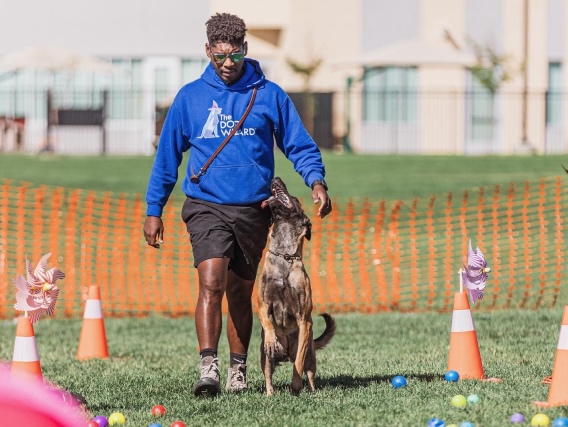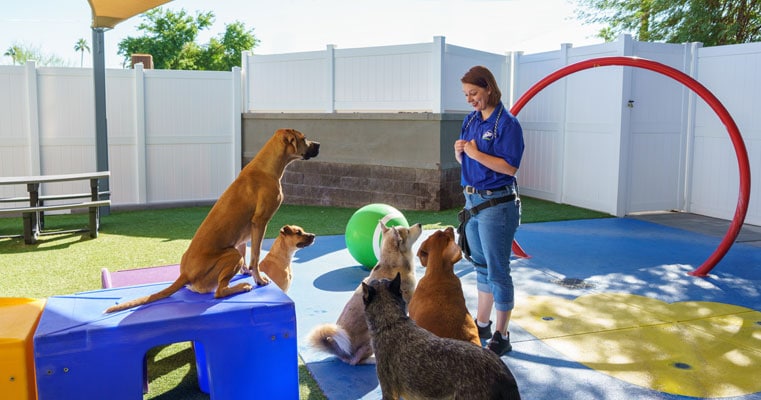Why Dog Training Near Me is Crucial for Your Canine Buddy
Why Dog Training Near Me is Crucial for Your Canine Buddy
Blog Article
Unlock Your Pet's Possible: Proven Canine Training Methods for Success
Reliable dog training is a nuanced procedure that hinges on understanding canine habits and employing scientifically backed strategies. By including positive reinforcement, developing clear commands, and prioritizing socializing, canine proprietors can grow an efficient partnership with their family pets.
Understanding Pet Habits
Recognizing pet dog behavior is essential for efficient training and fostering a positive partnership between dogs and their proprietors. A detailed understanding of canine body movement, vocalizations, and social interactions is essential for acknowledging their feelings and demands. Canines connect mostly with non-verbal signs; as an example, a wagging tail might suggest excitement, while pinned ears can indicate anxiety or entry.

Furthermore, environmental variables play a significant role in shaping a dog's behavior. Adjustments in regular, brand-new surroundings, or the existence of strange people can cause anxiety or stress and anxiety in canines. Recognizing these triggers enables proprietors to alleviate negative reactions and develop appropriate training approaches.
Inevitably, a deep understanding of pet dog behavior lays the structure for effective training techniques, improving both actions and the general bond between the pet and its proprietor. dog training charlotte nc. This understanding is important for fostering a well-adjusted, satisfied canine buddy
Favorable Support Techniques
Reliable training depends heavily on favorable reinforcement strategies, which have been revealed to yield substantial results in forming preferred actions in pet dogs. This approach entails rewarding a pet for displaying details habits, thereby boosting the likelihood that these actions will be duplicated. Incentives can take different kinds, including treats, praise, toys, or play, depending upon what encourages the private pet.

It is necessary to gradually phase out incentives as the pet dog discovers the behavior, transitioning to recurring reinforcement. This strategy keeps the habits in time while preventing dependence on consistent benefits. By concentrating on favorable reinforcement, trainers can grow a trusting partnership with their pet dogs, promoting a participating and healthy and balanced training environment that boosts overall obedience and efficiency.
Establishing Regular Commands
A fundamental facet of successful pet training is the establishment of regular commands. Consistency in commands is crucial for efficient interaction between the pet and the fitness instructor. When commands are consistent, canines find out to link certain words with preferred behaviors, which increases the training procedure and enhances understanding.
To establish constant commands, it is important that all household members make use of the same terminology and motions. For instance, if someone makes use of "sit" while one more says "rest down," it can create confusion for the pet dog. Select clear, unique words for commands and ensure everybody associated with the pet's training abides by these options.
Enhance commands via constant technique, making sure that the dog receives ample opportunities to respond properly. When a pet dog effectively complies with a command, instant positive reinforcement ought to follow.
Lastly, be patient. Developing regular commands takes time and effort. With dedication and quality, you will certainly aid your pet dog establish a strong understanding of assumptions, inevitably causing a mannerly buddy.
Socialization and Exposure
Socializing a pet is essential for cultivating a positive and well-adjusted companion. This procedure includes exposing your dog to a variety of settings, people, and various other pets to develop their social abilities and versatility. Early socialization, preferably between the ages of 3 to fourteen weeks, is crucial, as it prepares for a pet dog's future behavior.
Throughout socialization, purpose to supply positive experiences in various settings, such as parks, hectic streets, and homes with other pet dogs. Introduce your pet to different stimulations, including audios, sights, and scents, guaranteeing that each experience is rewarding. This direct exposure assists mitigate concern and anxiety, leading the way for a much read this more resistant canine.
Participating in controlled group play sessions with other pet dogs can likewise boost social abilities, teaching your pet ideal interactions and boundaries. Constantly monitor your pet's convenience degree throughout these experiences, gradually raising direct exposure as their self-confidence expands. Bear in mind, the objective is to create an all-round family pet that prospers in varied situations, promoting an unified relationship with both humans and other animals. Focusing on socialization will significantly contribute to your pet dog's total joy and habits throughout their life.
Conquering Common Training Challenges

An additional frequent problem is disturbance. Pets may have a hard time to focus in busy or unknown settings. Slowly desensitize your pet dog to disturbances by beginning training in a quiet setting and slowly introducing more stimulations as they end up being proficient (dog training charlotte nc). Favorable support techniques, such as deals with and appreciation, can preserve inspiration and emphasis.
In addition, behavior issues like leaping or extreme barking can end up being frustrating. Address these by showing alternate actions, such as sitting steadly when welcoming visitors. Consistency and patience are crucial; strengthen preferred behaviors continually and stay clear of scolding, which can lead to confusion.
Last but not least, identify that each pet dog is unique, and training timelines may differ. Tailor your strategy to your dog's individual requirements, and seek expert assistance if essential. With perseverance and the right strategies, getting rid of these challenges can bring about a well-trained, happy canine friend.
Verdict
Finally, opening a dog's potential requires a comprehensive method that includes an understanding of canine habits, the application of favorable support strategies, and the establishment of regular commands. Early socializing and direct exposure to diverse settings even more boost a canine's flexibility and self-confidence. By attending to typical training obstacles with tailored techniques and persistence, a harmonious and cooperative connection in between pet check my source and trainer can be fostered, eventually leading to a mannerly friend qualified of prospering in various circumstances.
Effective dog training is a nuanced process that pivots on understanding canine habits and employing scientifically backed methods.Recognizing canine habits is necessary for go to the website effective training and fostering a favorable partnership between pet dogs and their owners.Efficient training relies greatly on positive reinforcement methods, which have actually been shown to yield significant results in forming wanted habits in canines. When commands are uniform, pets find out to associate specific words with desired habits, which accelerates the training process and enhances understanding.
In final thought, unlocking a pet's potential necessitates an extensive method that integrates an understanding of canine behavior, the application of positive support strategies, and the establishment of consistent commands.
Report this page